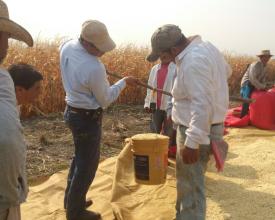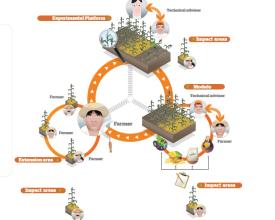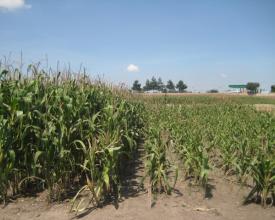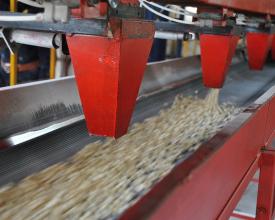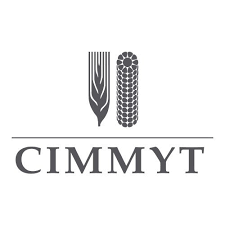
MasAgro: Alianza entre el CIMMYT y México para la producción sostenible de maíz
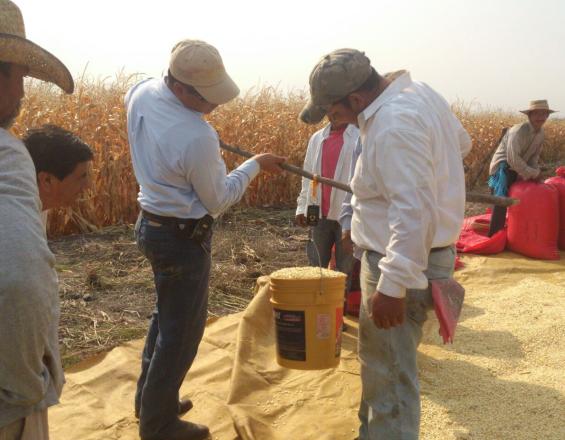
El proyecto MasAgro, dirigido por el CIMMYT, desarrolla la capacidad de los agricultores para adoptar el producto de la investigación sobre conservación y mejora del maíz, agronomía, maquinaria, TIC y soluciones poscosecha. MasAgro ha desarrollado 49 variedades mejoradas de maíz adaptadas a la agricultura a pequeña escala en México. Agricultores y mejoradores colaboran para mejorar el potencial de rendimiento del maíz nativo y su resistencia a las enfermedades. Las semillas mejoradas y la agricultura de conservación han ayudado a los agricultores a aumentar el rendimiento y mantenerlo por encima de la media nacional. Los agricultores participantes lograron, de media, un aumento del 25% tanto en rendimiento como en ingresos anuales. Más de 30 empresas locales de semillas vendieron 1,1 millones de sacos de semillas mejoradas en 2017, una cuota de mercado combinada del 21%. Por cada dólar invertido, los agricultores participantes ganan 7. Esta estrategia puede reproducirse en formaciones, mejora participativa del maíz o proyectos más ambiciosos de mejora genética y desarrollo de capacidades.
Contexto
Défis à relever
La agricultura contribuye significativamente a las emisiones de gases de efecto invernadero (GEI). La agricultura de conservación (AC), basada en una alteración mínima del suelo, una cubierta vegetal permanente y la rotación de cultivos, reduce las emisiones de GEI. La AC mejora la infiltración de agua y la retención de humedad en el suelo, conserva la fertilidad y la salud del suelo y aumenta la productividad y los ingresos de los agricultores. En el altiplano mexicano, donde el CIMMYT lleva realizando un ensayo de campo desde 1991, la AC tiene un potencial de calentamiento global (PCG) inferior al de la labranza convencional (LC). Durante la última sequía en la región (2009), el PCG (incluyendo el secuestro de carbono en el suelo, las emisiones de GEI, el uso de combustible y fertilizantes) del maíz cultivado con AC fue de -7.729 kg de CO2 por hectárea, frente a los 1.327 kg de CO2 por hectárea del maíz cultivado con TC. El contenido de agua en el suelo se mantuvo por encima o cerca del punto de marchitez durante todo el periodo seco con la AC, mientras que los valores de agua en el suelo estuvieron por debajo del punto de marchitez durante tres semanas con la TC. Los rendimientos fueron hasta 4,7 toneladas por hectárea superiores con AC que con TC.
Ubicación
Procesar
Resumen del proceso
El CIMMYT y la SAGARPA están implementando MasAgro para ayudar a abordar los retos de la producción de maíz, la conservación de la biodiversidad, la seguridad alimentaria y el desarrollo rural sostenible. MasAgro desarrolla una estrategia de intensificación sostenible de los sistemas de producción de maíz basada en la agricultura de conservación, y en el desarrollo y transferencia a los campos de los agricultores de semillas de maíz mejoradas, de alto rendimiento y preparadas para el clima. MasAgro desarrolla la capacidad de los pequeños agricultores para adoptar el producto de la investigación del CIMMYT sobre conservación y mejora del maíz, agronomía, maquinaria agrícola, tecnologías de la información y la comunicación (TIC) y soluciones de almacenamiento poscosecha. El CIMMYT ha desarrollado redes o centros de innovación entre agricultores de maíz, investigadores, proveedores de servicios, agentes de extensión, autoridades, productores locales de semillas y representantes de la industria en 12 regiones de México que tienen condiciones agronómicas, ecológicas, climáticas, de infraestructura y de mercado específicas relevantes para la producción de maíz. MasAgro ofrece capacitación a extensionistas, técnicos y agricultores que mantienen un intercambio permanente de información que ha sido clave para lograr la conservación y eficiencia en el uso de los recursos, el aumento de la productividad y el incremento de los ingresos.
Bloques de construcción
Intensificación sostenible
MasAgro se encuentra en su séptimo año de ejecución desarrollando una estrategia de intensificación sostenible de los sistemas de producción de maíz basada en la agricultura de conservación y en el desarrollo y la transferencia a los campos de los agricultores de semillas de maíz mejoradas, de alto rendimiento y preparadas para el clima. MasAgro desarrolla la capacidad de los pequeños agricultores para adoptar el producto de la investigación del CIMMYT sobre conservación y mejora del maíz, agronomía, maquinaria agrícola, tecnologías de la información y la comunicación (TIC) y soluciones de almacenamiento poscosecha. El CIMMYT ha desarrollado redes o polos de innovación entre agricultores de maíz, investigadores, proveedores de servicios, agentes de extensión, autoridades, productores locales de semillas y representantes de la industria en 12 regiones de México que tienen condiciones agronómicas, ecológicas, climáticas, de infraestructura y de mercado específicas y relevantes para la producción de maíz. Cada centro está formado por plataformas de investigación, módulos de demostración, áreas de extensión e impacto donde se desarrollan, prueban y adaptan a las necesidades de los agricultores semillas mejoradas, sistemas de manejo, maquinaria agrícola y TIC. MasAgro ofrece formación a agentes de extensión, técnicos y agricultores que mantienen un intercambio continuo de información que ha sido clave para lograr la conservación y la eficiencia en el uso de los recursos, el aumento de la productividad y el incremento de los ingresos.
Factores facilitadores
Cada año, la infraestructura de investigación y las áreas de impacto de MasAgro dependen del tipo y número de participantes, aunque la SAGARPA proporciona la financiación básica y el CIMMYT dirige las actividades de I+D. El CIMMYT y el sistema de investigación agrícola de México han obtenido y liberado 49 variedades mejoradas de maíz adaptadas a las condiciones agrícolas de México. El CIMMYT también ha ofrecido formación a más de 50 empresas semilleras mexicanas que comercializan las semillas mejoradas en las zonas seleccionadas. La intensificación sostenible ayuda a los agricultores a alcanzar el potencial de rendimiento de las semillas mejoradas.
Lección aprendida
Es importante gestionar las expectativas de los socios financiadores, que a menudo están ansiosos por informar de resultados sobresalientes en términos de número de agricultores alcanzados o aumentos de rendimiento logrados. Los proyectos de investigación agrícola para el desarrollo sostenible tardan en cobrar impulso y en atraer la atención de los agricultores, que suelen mostrarse escépticos ante las nuevas prácticas agrícolas o decepcionados por programas financiados con fondos públicos que han fracasado en el pasado. Los agricultores suelen ser reacios a innovar porque se juegan mucho. Si un ciclo de cultivo fracasa, pierden sus ingresos anuales, por lo que la innovación debe ser gradual y participativa. MasAgro ha logrado superar la aversión al riesgo promoviendo un cambio gradual e incremental en las parcelas de los agricultores. Los agricultores participantes adoptan primero prácticas de intensificación sostenible en una fracción de sus tierras para comparar su rendimiento con el resto de la parcela gestionada convencionalmente. De este modo también adquieren experiencia con la agricultura sostenible y confianza para extender gradualmente el uso del nuevo sistema de gestión. Para tener éxito, los agricultores deben tener acceso al asesoramiento de expertos.
Asociaciones público-privadas
El CIMMYT y más de 150 socios locales e internacionales de los sectores público y privado participan en las actividades de investigación y desarrollo (I+D) de MasAgro y contribuyen a su implementación en los 12 polos antes mencionados. Cada año, la infraestructura de investigación y las áreas de impacto de MasAgro dependen del diferente tipo y número de participantes, aunque la SAGARPA proporciona la financiación básica y el CIMMYT lidera la mayoría de las actividades de I+D. El CIMMYT y el sistema de investigación agrícola de México (INIFAP) han obtenido y liberado 49 variedades mejoradas de maíz blanco y maíz amarillo que se adaptan a las condiciones agrícolas de pequeña escala y de temporal en el centro, sur y sureste de México. El CIMMYT también ha ofrecido capacitación especializada a más de 50 empresas semilleras mexicanas que reproducen y comercializan las semillas mejoradas en las zonas objetivo de MasAgro. Para ayudar a los agricultores a adoptar y alcanzar el potencial de rendimiento de las variedades mejoradas de maíz, el CIMMYT implementa la estrategia de intensificación sostenible descrita anteriormente.
Factores facilitadores
Las asociaciones público-privadas requieren un enfoque flexible de los derechos de propiedad intelectual. El CIMMYT ha podido mediar en estas asociaciones en beneficio de miles de agricultores porque el producto de su investigación está libre de derechos de propiedad intelectual y tiene la condición de bien público universal, ya sean semillas mejoradas, conocimientos agronómicos, prototipos de maquinaria inteligente o genotipos de maíz y trigo. Los socios de un acuerdo de esta naturaleza deben estar dispuestos a intercambiar información y a colaborar entre sí.
Lección aprendida
Lleva tiempo desarrollar una red eficaz de socios. Algunas empresas locales de semillas no devolvían la información de los ensayos de campo ni de los mercados. Querían tener acceso a líneas mejoradas de maíz adaptadas a los mercados donde vendían semillas, pero se mostraban reacias o incapaces de devolver la información necesaria para seguir seleccionando o identificando los mejores materiales. Se hizo necesario ofrecer formación especializada sobre producción y comercialización de semillas a las empresas locales de semillas. También fue necesario generar confianza en la red de investigación y desarrollo, y ayudar a los representantes de las distintas empresas a identificar nuevos mercados para sus productos. El CIMMYT identificó diferentes regiones de México que podrían aumentar la producción de maíz sustituyendo las variedades locales por nuevas semillas de alto rendimiento y resistencia. Estas zonas de conversión de potencial medio a alto ofrecieron nuevos mercados e incentivos a las empresas locales de semillas que participan en MasAgro. Estas actividades han ido acompañadas de esfuerzos continuos para formar a los agricultores en la adopción de la nueva semilla de alto rendimiento para que puedan alcanzar todo su potencial de rendimiento.
Impactos
Solo en 2017, los socios y participantes del proyecto establecieron 52 plataformas de investigación, 1,468 módulos demostrativos de prácticas agrícolas sustentables y 9,053 áreas de extensión en 30 estados de México. Los expertos de MasAgro organizaron 2.099 días de campo para promover la agricultura sostenible en 12 centros. En estos eventos demostrativos participaron 33.348 agricultores. Además, 5.935 técnicos y agentes de extensión asistieron a los cursos de formación de MasAgro. 40 técnicos también completaron un programa de certificación de un año y se unieron a los 360 expertos que el CIMMYT ha certificado en agricultura sostenible desde 2011. Estos técnicos monitorearon las prácticas de agricultura sostenible en 1.390 módulos demostrativos y en 9.673 áreas de extensión que cubren más de 28.000 hectáreas. La información recopilada en el campo se registró en la bitácora electrónica de MasAgro y se agregó a la base de datos del proyecto de seis años (2011-2017).
Los últimos datos disponibles muestran que la productividad y los ingresos de los agricultores participantes que cultivan maíz en condiciones de secano fueron 92% y 105% más altos, respectivamente, que los rendimientos e ingresos promedio alcanzados por otros agricultores en México. De media, las parcelas de secano gestionadas con las prácticas de intensificación sostenible de MasAgro produjeron un 25% más de grano e ingresos para los cultivadores de maíz que las parcelas gestionadas con prácticas convencionales en la misma explotación. Del mismo modo, las empresas mexicanas de semillas han aumentado un 70% sus ventas de semillas mejoradas desde 2011.
Beneficiarios
MasAgro ha tenido un impacto positivo en las vidas de más de 300.000 agricultores que han adoptado tecnologías de agricultura de conservación y agricultura sostenible en 1,3 millones de hectáreas para cultivar 49 variedades de maíz mejoradas para condiciones de secano en todo México.
Objetivos de Desarrollo Sostenible
Historia
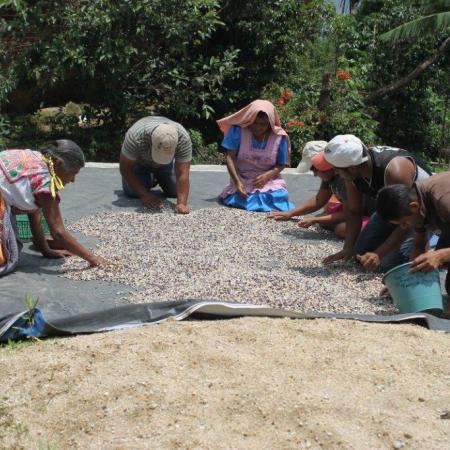
El CIMMYT conserva y mejora la biodiversidad en comunidades de Oaxaca y la Península de Yucatán donde los agricultores de subsistencia cultivan maíz nativo. En 2017, MasAgro realizó 38 ensayos participativos de mejoramiento de maíz nativo en 12 comunidades indígenas de Oaxaca. Agricultores locales, mejoradores del CIMMYT y del INIFAP colaboraron para mejorar el potencial de rendimiento del maíz nativo y su resistencia a enfermedades prevalentes, como el complejo de manchas de alquitrán, que causa pérdidas de rendimiento de hasta 90%. El CIMMYT también está repatriando variedades criollas de maíz en riesgo en la Península de Yucatán, donde los agricultores, en busca de mejores oportunidades, dejan de cultivar variedades nativas. El CIMMYT se asoció con la Fundación Estados del Mundo Maya, con sede en Mérida, para ayudar a los agricultores a conseguir un mejor precio para sus productos en mercados establecidos y nuevos. Grandes chefs de México, Europa y EE.UU. se han abastecido de grano de pequeños agricultores de Oaxaca y la Península de Yucatán, entre ellos Enrique Olvera (Cosme, NYC, y Pujol, Ciudad de México) y René Redzepi (noma, Copenhague) .
